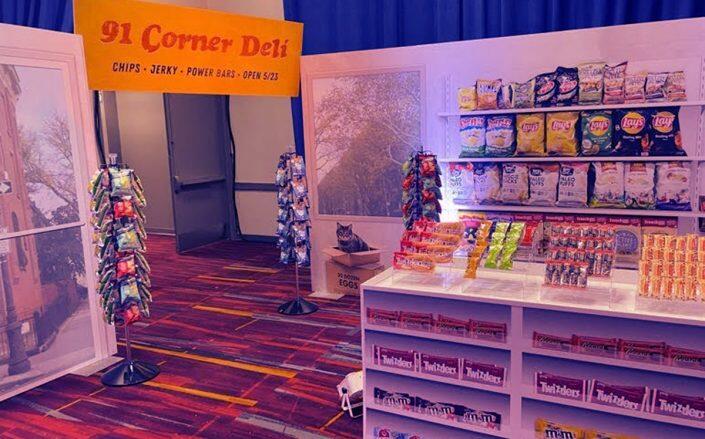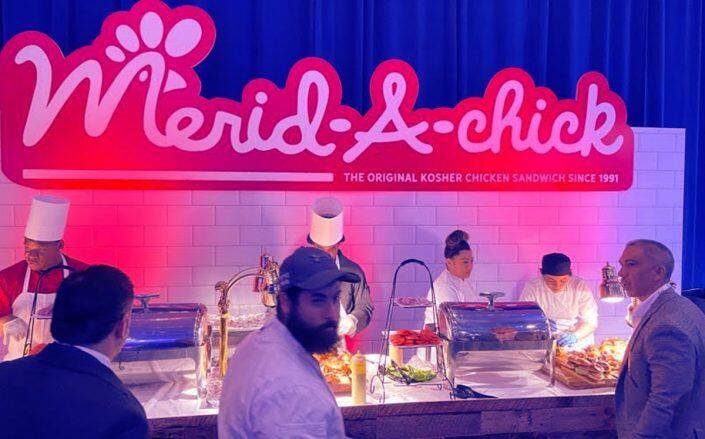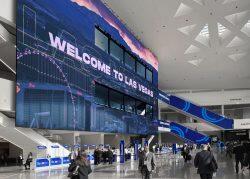After partying the day away Sunday, retailers at ICSC Las Vegas swapped their swimsuits for business suits as they gathered for some old-fashioned, in-person networking.
Monday’s annual industry conference, held in Sin City’s cavernous convention center, marked a stark departure from December’s thinned-out event for a still-struggling sector.
This year, nearly 22,000 people registered, according to ICSC — short of the 30,000 or more that attended in previous years, but enough to call it a comeback. Day-of registrations figure to add to the count.
Attendees said the turnout in Vegas signaled hope for a sector that the odds haven’t favored in quite some time.
“I’m surprised how big it is, actually,” said Ben Miller of Tampa-based Franklin Street Capital Advisors at a buzzing luncheon hosted by Meridian Capital Group. “I thought Covid would have had a bigger impact on attendance, but it really hasn’t.”
As guests returned following December’s pandemic dud, so did brands. Some 756 companies bought booths in the convention hall this year, with everyone from the big players to small-town development committees crowding in for a chance to talk shop and trade business cards.
CBRE’s “booth” was a convention in its own right. The commercial real estate juggernaut shipped in more than two dozen meeting tables, several conference rooms and a podcast/video studio to record broker testimonials and an episode of its business podcast.
Cushman & Wakefield’s setup featured artificial hedges and sleek white high-top tables. QR codes throughout the display linked to web posts about trends in real estate like improving a building’s environmental footprint and an influx of digital brands leasing their first brick-and-mortar stores.

(photos by Joe Lovinger/The Real Deal)
Collier’s brought the coffee, with a link to a web page about its diversity efforts printed on the cups.
Ashkenazy Acquisition kept a characteristically low profile. The firm eschewed the glass walls and open floor plans of other booths for more of a walled-garden approach.
At its tightly guarded entryway, a receptionist declined to make Ashkenazy representatives available to talk with The Real Deal. Tall barriers plastered with images of the company’s properties surrounded a handful of tables inside.
And then there was CoStar. The data provider built a two-level conference center with glass-walled meeting rooms, each equipped with a large display screen. It also raffled off a Tesla with $25,000 in cash spread across the dashboard.
“The winner will probably need that to pay the taxes,” said an observant security guard hired to protect the money.
Some major players including Simon and Brookfield skipped the convention hall, letting their tenants come and kiss the ring (or vice versa, as the case may be) at their hotels on the strip.
“The reality is that in the last four or five years, the format has changed. A lot of the big developers left the show and have their meetings outside,” said Ariel Schuster, vice chairman at Newmark, who has been attending ICSC for 20 years. “I had a meeting with a retailer, and they now have to jump in a cab and go to Caesars. It’s taken away some of the connectivity.”

(photos by Joe Lovinger/The Real Deal)
In a town known for its bacchanalian buffets, Meridian put together a kosher feast to rival anything you’d find on the Strip. The spread, which took up four standard event spaces and featured six genres of food, offered sushi, a brisket carving station, a salad station dubbed “Caesar Palace” and perhaps the best-tasting Glatt chicken sandwich ever.
Danny Heumann, a Meridian exec, slipped behind the sushi counter to chat with the chef and seconds later returned to the floor with a loaded plate of sashimi. Nicole Kushner Meyer, president of Kushner Companies, took phone calls in the hallway.

(photos by Joe Lovinger/The Real Deal)
In a brief speech, Meridian Capital Group president Yoni Goodman alluded to the troubles facing the industry, before giving his audience a classic real estate spin.
“None of this comes amidst a quiet world. From the horrible war in Ukraine, to Covid, rate hikes, the national discourse and raging inflation,” Goodman said. “There’s no more important time to have a trusted broker representing you than it is today.”
This week’s convention marked the first ICSC affair in May since Covid, and conversations with executives underscored that the pandemic is still weighing heavily on retail’s future. Naturally, most industry folk focused on the positives.
Brandon Isner, head of retail research for CBRE, sees upcoming opportunities split between old-fashioned brick and mortar and the endless frontier of the metaverse.

(photos by Joe Lovinger/The Real Deal)
Isner kicked off Monday’s event with a data-heavy talk about the latter, detailing how retailers might boost sales in that virtual land. He highlighted brands Forever 21, Lego, American Eagle and Nike, all of which have either launched or plan to unveil virtual storefronts. Nearly one-third of organizations will join them in the next four years, according to tech research and consulting firm Gartner.
Part of the draw is the novelty, but for retailers, the metaverse’s appeal stems also from necessity.
“This may come as a surprise to people, but we keep talking about how tight retail spaces are getting,” Isner told The Real Deal. “Sure, you can’t find space in this market, but what kind of possibilities open up if you set up a store in the metaverse?”
Isner floated the idea of building a virtual Greenpoint — a digital twin — where retail tenants wouldn’t need to rely on physical real estate to pull in customers. A build-out of that scale would still be “years and years down the road,” he cautioned.

(photos by Joe Lovinger/The Real Deal)
On the ground, though, a reverse trend of sorts is taking root as digital-first brands flock to in-store spaces.
With high warehousing and shipping costs — and pandemic discounts on retail rents still available across the city — digital brands have been chasing growth by leasing their first storefronts. Newmark’s Schuster cites recent leasing by affordable eyewear brand Warby Parker and Allbirds, the shoe lifted to cult status on the heels of tech bros.
“You read the Allbirds prospective, you read the Warby prospective. You have to have stores. You can’t be a billion-dollar brand online only,” Schuster said. The executive noted that Manhattan’s downtown shopping corridors have emerged as a go-to spot for new leasing.
“Soho’s like a feeding frenzy,” Schuster said.
Another New York region with a growing retail scene is Long Island. “It’s one of the few New York markets with room available,” Isner said.

(photos by Joe Lovinger/The Real Deal)
And like residential cuts of Brooklyn or the Upper East and Upper West sides, shops in the suburbs east of the city have benefitted as remote workers commute into Midtown less.
Unleashed from Manhattan, Long Islanders still crave opportunities to shop in stores, Isner said, adding that demand for neighborhood retail “is here to stay.”
But amid those prospects, executives couldn’t help but acknowledge emerging pain points on retail’s horizon.
“It’s like a push and pull,” Jonathan Stern, senior managing director at Meridian, said during the firm’s Monday lunch.
“You’re seeing interest rates go up; that impacts a lot of deals. You’re hearing people throw around the word recession, depending on who you talk to,” he said. “But I’ve also talked to a bunch of people who are trying to sell us advertising.”
Stern said he views that activity — marketing professionals hoping to boost brand sales — as a leading indicator that shoppers are still buying, despite inflation’s hit to spending power.
Schuster echoed that take.
“So far the consumer has been spending,” the Newmark exec said. “Are we going into a recession? Who knows? That’s above my pay grade. But the consumer has been spending.”
Isner offered supporting evidence: The pandemic boosted personal savings, and while rising prices may have eroded them, “disposable-income-to-debt ratios are still very, very good,” he said.
That bullish take amid a looming bear market could sum up the zeitgeist of the conference.
“I’m feeling 100 percent optimistic; I think you have to be optimistic to survive in this business,” said James Famularo, Meridian’s president of retail leasing.
“No offense to you guys, but I know reporters like to write about doom and gloom. So when I hear, ‘Oh, monkey pox is coming!’ I know it’s B.S.” he added. On the heels of the coronavirus, he might have picked a better example but … point taken.
Given the world’s laundry list of stressors — war, inflation, Covid, plunging stocks, rate hikes — following a crushing few years for retail, it’s easy to see why Famularo would prioritize the positives.
For now, it seems retail’s key players are willing to pack up their troubles in their old kit-bag, as the marching song goes, and smile, smile, smile.
Read more


